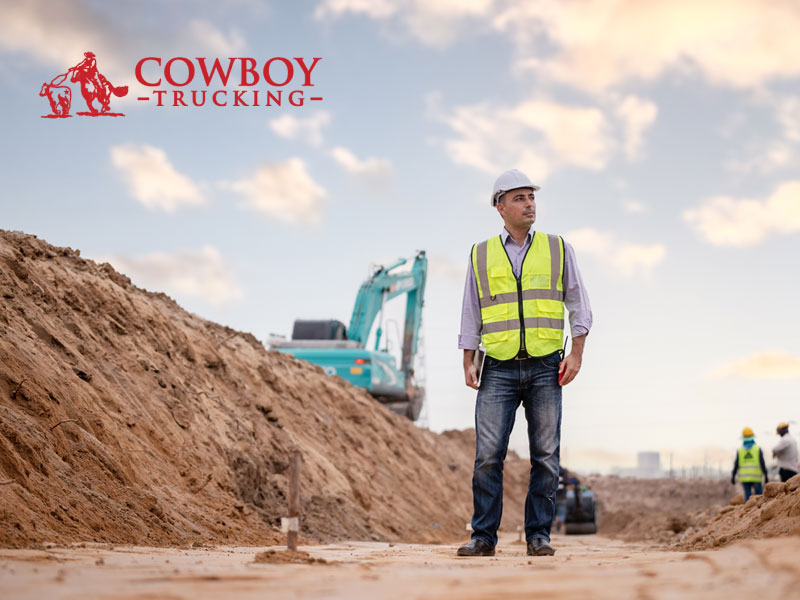
For anyone hauling construction materials in Texas, rules keep everyone safe, your projects on schedule, and your reputation intact. What’s not to love about rules and regulations!
However, whether you’re coordinating your own fleet or relying on a trusted partner, it pays to know the specific regulations and safety standards that apply when materials move to and from your construction site.
It can save you many headaches and stress later.
Why Rules Matter When Hauling Construction Materials
When you’re managing a site, you’ve got enough to worry about already, with permits, crews, weather, deadlines, etc.
But trucking compliance matters. Texas adds its own layer of requirements to federal rules – from intrastate driver rules to route restrictions – and local inspectors take these seriously. They impose hefty fines and even work stoppages for violations.
Besides, hauling unsafe loads increases the risk of accidents, injuries, and lost time.
So – it’s important to ensure your haulers stay in line with Texas law. This also helps show your clients you’re running a professional operation.
Let’s quickly revise the rules in Texas.
Texas Rules for Hauling Construction Materials
Here are five of the most important Texas regulations:
CDL Endorsements
If your project involves hazardous materials (even small amounts of fuel or chemicals), your hauler also needs a HazMat endorsement and must pass a Transportation Security Administration background check. Don’t assume a driver automatically has this clearance.
ELP Requirements
This is a safety standard too! The rules for English Language Proficiency have changed. See the details in this post.
Briefly, although Texas currently allows intrastate drivers to not speak English, what now determines compliance is the haul and its journey, which might be interstate. Enforcement is now high.
Weight Limits and Permits
Texas enforces axle-based weight limits and maximum gross vehicle weights on all public roads.
Check whether you require an overweight permit. The fine for running overweight without a permit can run into thousands of dollars per incident – and you’re on the hook if you hired the carrier.
Oversized Loads
Moving materials that exceed standard height, width, or length? Texas requires an oversize permit and often limits movement to daylight hours and certain routes. Flag cars or pilot vehicles may also be mandatory depending on the load.
Designated Routes
Not every road is open to every truck. Hauling hazardous materials? Texas law restricts you to designated HazMat routes and bans travel through certain tunnels, bridges, and populated areas. Make sure your hauler plans accordingly.
Safety Standards for Hauling Construction Materials
Compliance doesn’t stop with paperwork. Safety and liability also refer to how materials are loaded, secured, and delivered. Here are a few key practices you should expect from your hauling partner:
Cargo securement: Materials must be tied down securely and in line with FMCSA cargo securement rules to prevent shifting or falling en route. You need the right number, type, and placement of tie-downs for the weight and type of material, plus edge protectors for straps on sharp loads.
Pre-trip inspections: Before every trip, drivers should inspect the truck, trailer, and load. This includes checking tires, brakes, lights, and making sure the load hasn’t shifted before leaving the yard or site.
Hours of service (HOS): Drivers are limited in how long they can be on the road to prevent fatigue-related accidents. In Texas, the rules mirror FMCSA limits: generally no more than 11 hours driving within a 14-hour workday, and mandatory rest breaks. If your hauler ignores HOS and gets shut down, your materials will be delayed more than if they rest!
Site safety and PPE: Once trucks arrive, drivers should be equipped with proper personal protective equipment (PPE) – hard hats, high-visibility vests, gloves – and follow your site’s safety rules. It may sound basic, but haulers can show up unprepared for site conditions.
Holding your haulers accountable to these standards reduces risk on your site and keeps your crews and materials safe.
Common Mistakes to Avoid When Hauling Construction Materials
To move construction materials in Texas, you need a reliable, seasoned partner. Here’s a reminder of what to check out with them:
- Skipping permits: Check with your carrier that the truck can legally haul your load without the right oversize/overweight permit.
- Improper load securement: Confirm that your hauler is trained in proper techniques.
- Ignoring route restrictions: Discuss your site location and possibly restricted routes in advance to avoid fines and delays.
- Overworking drivers: Agree a reasonable schedule to help with HOS compliance.
When you know what to watch for — and communicate your expectations clearly — you can keep your projects running safely, smoothly, and on time.
Cowboy Trucking is Your Go-To Dallas Trucking Service
Quality of service and reliability are top of mind in our family business. For complete peace of mind about Texas rules and regulations on hauling your materials, give us a call and let’s talk.
Related blogs you may have missed:
Trucking Company Rules and Regulations in Texas
New Trucking Laws Could Affect How Materials Get Hauled
Texas Waste Disposal Regulations for Infrastructure Contractors
